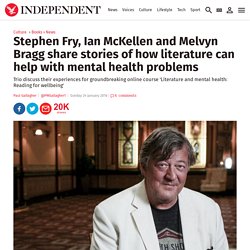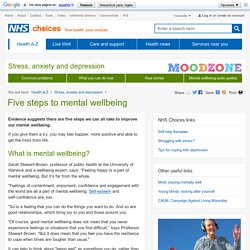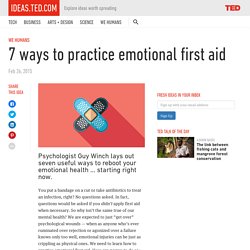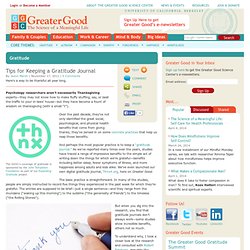

Mental health survey reveals pressure on young. Stephen Fry, Ian McKellen and Melvyn Bragg share stories of how literature can help with mental health problems. Stephen Fry, Sir Ian McKellen and Melvyn Bragg have each given deeply personal interviews to academics as part of a free online course which considers how poems, plays and novels can help us to understand and cope with deep emotional distress.

The trio discuss their experiences of some of the six themes – stress, heartbreak, bereavement, trauma, depression and bipolar, ageing and dementia – that make up “Literature and mental health: Reading for wellbeing”. Each man also describes how the work of literary greats such as Shakespeare, WH Auden and Philip Larkin have helped them during troubled times. Fry has experienced mental health problems throughout his life, but was not diagnosed with bipolar disorder until he was 37. Five steps to mental wellbeing - Stress, anxiety and depression - NHS choices. Evidence suggests there are five steps we can all take to improve our mental wellbeing.

If you give them a try, you may feel happier, more positive and able to get the most from life. What is mental wellbeing? Sarah Stewart-Brown, professor of public health at the University of Warwick and a wellbeing expert, says: "Feeling happy is a part of mental wellbeing. But it’s far from the whole. "Feelings of contentment, enjoyment, confidence and engagement with the world are all a part of mental wellbeing. 'Did I inherit mental illness?' 7 ways to practice emotional first aid. You put a bandage on a cut or take antibiotics to treat an infection, right?

No questions asked. In fact, questions would be asked if you didn’t apply first aid when necessary. Mental Health: It's Time To Talk. Mental illness in your family - Family Mental Health Issues. Mental Health Medication - Headmeds. Depression - Coping with Depression. Tips for Keeping a Gratitude Journal. Psychology researchers aren’t necessarily Thanksgiving experts—they may not know how to make fluffy stuffing, say, or beat the traffic to your in-laws’ house—but they have become a fount of wisdom on thanksgiving (with a small “t”).

Over the past decade, they’ve not only identified the great social, psychological, and physical health benefits that come from giving thanks; they’ve zeroed in on some concrete practices that help us reap those benefits. And perhaps the most popular practice is to keep a “gratitude journal.” As we’ve reported many times over the years, studies have traced a range of impressive benefits to the simple act of writing down the things for which we’re grateful—benefits including better sleep, fewer symptoms of illness, and more happiness among adults and kids alike.
We’ve even launched our own digital gratitude journal, Thnx4.org, here on Greater Good. The basic practice is straightforward.